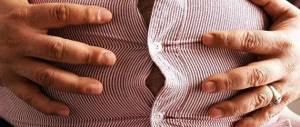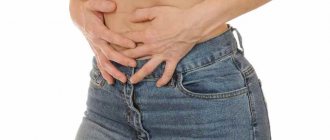As the end of the menstrual cycle approaches, followed by the onset of menstruation, a woman experiences certain symptoms. Each representative of the fair sex has her own set of signs of approaching menstruation. Bloating before your period is a very common symptom.
This phenomenon should not scare girls. Due to changes in hormonal levels, the appearance of bloating and flatulence in most cases is a normal physiological reaction. But there are other reasons for an increase in waist size before menstruation.
What causes heaviness in the stomach
The pelvis contains the organs of the reproductive and excretory systems, and any diseases associated with them can cause a feeling of heaviness in the lower abdomen. The most common reasons include:
- dysmenorrhea;
- gynecological diseases;
- pathologies of the urinary organs;
- gastrointestinal diseases.
Heaviness in the abdomen may occur due to disruptions in the gastrointestinal tract
Problems with the spine also give such symptoms, especially if the lumbosacral region is affected.
If you have problems with the spine, you may feel heaviness in the stomach
Another reason is pregnancy: heaviness in the abdomen is caused by completely natural processes that occur in a woman’s body during this period. True, various pathologies are possible here, too, so you should carefully listen to your feelings and notice any deviations from the norm.
Heaviness and pain during pregnancy
Causes of bloating before menstruation
To combat unpleasant symptoms of PMS, you need to know the reasons for their occurrence. They are divided into a number of categories.
The menstrual cycle of women is a complex process, accompanied by monthly hormonal changes in the body during the childbearing period. The changes are associated with the level of three hormones: prolactin, progesterone, estrogen. The level of estrogen increases at the time of ovulation, gradually decreasing, with progesterone on the contrary:
- Endometrial growth. The female hormone responsible for preparing the body for conception and bearing a child is called progesterone. It stimulates the growth of the endometrium (the mucous membrane inside the uterus), which has a porous structure consisting of many blood vessels. The substances necessary for development are supplied to the embryo through the vessels. This is how the body prepares for conception. The uterus swells, affecting the intestines, and the size of the abdominal muscles increases. If pregnancy does not occur, the reverse process begins. The membrane peels off, leaves the body with blood during menstruation, compression of neighboring organs goes away, and the size of the uterus returns to normal.
- Swelling. These same hormones force the female body to accumulate excess water in the abdominal tissues, arms, legs, and face. During blood loss, this helps to avoid dehydration and, when processed, the fluid enters the blood.
- Ovulation. Often the belly begins to swell during ovulation. A strong hormonal surge occurs, to which the body reacts with pain, bloating, and flatulence.
In the period after ovulation before spotting, blood flow to the uterus and ovaries increases. They begin to swell, squeezing the intestinal walls, causing spasms. Food moves unevenly, forming air barriers. The woman's stomach growls, swells, severe gas formation begins, and stool upset. After menstruation everything returns to normal.
Pregnancy
Perhaps pregnancy has occurred. In the first weeks it is difficult to determine. Due to the hormone progesterone, a change occurs in the body that prepares the female organs for bearing and giving birth to a child. The stomach inflates, the chest swells, and body weight increases. It is possible to independently determine pregnancy in the early stages by a hard lump in the lower abdomen.
A slight swelling in the waist area does not interfere with everyday life, but if the stomach is very swollen before menstruation, constantly rumbles, and hurts, this indicates hidden human illnesses:
- Gastrointestinal diseases. Colitis and gastroduodenitis are often chronic, sometimes manifesting as acute attacks of pain. Blood and water, having accumulated in the abdominal cavity, put pressure on the internal organs, provoking an exacerbation of diseases. Gases swell the intestines, causing cramps, nausea, flatulence, and problems with bowel movements. Severe pain is likely in the lower abdominal cavity, in the navel area.
- Genitourinary system. With kidney disease, fluid is constantly retained in the body, and when menstruation occurs, the frequency of urination decreases significantly. An enlarged abdomen is accompanied by: swelling of the legs, arms, and face. Bags appear under the eyes, constant dull pain in the lower back. There is drowsiness, lethargy, and rapid heartbeat. Blood pressure rises.
- Gynecological diseases. The symptom “acute abdomen” is considered a sign of female diseases, which are characterized by severe pain and spasms radiating to the anus and lower back:
- inflammation of the ovaries, uterus;
- adhesions in the pelvic organs;
- chronic oophoritis;
- ovarian cyst;
- neoplasm: uterine fibroids. This benign tumor can develop into malignant. The presence of fibroids is characterized by a rounded tummy, as during pregnancy, then severe pain appears, and menstruation may stop. If you have fibroids, you should be under constant supervision of a gynecologist and undergo an examination once a year.
Binge eating
Thanks to the hormone progesterone, which acts on the nervous system, almost all women begin to feel hungry a week before their period. They eat a lot, become nervous and irritable.
To cheer up, you want to experience joy, have fun. The easiest way to get rid of depression is to eat delicious food. And everything tasty, as a rule, high-calorie or salty, leads to fluid retention and the appearance of a round belly.
PMS and the associated hormonal imbalance negatively affect a woman's will. If usually many limit themselves in food and refuse sweets, then here women give in.
Large volumes of food at this time are poorly digested, food masses stagnate in the intestines. The result is flatulence and bloating.
Dysmenorrhea
Dysmenorrhea is pain during menstruation that occurs in the lower abdomen.
More than half of women of reproductive age worldwide suffer from periodic pain during menstruation
Experts distinguish two types of dysmenorrhea: primary, the cause of which has not been identified, and secondary, developing as a result of gynecological pathologies. The first type is observed in approximately half of the female population of the planet, and 10% have very difficult periods. Symptoms usually decrease with age and disappear completely after childbirth. Secondary dysmenorrhea is diagnosed less frequently, and mainly in women over 30 years of age.
It is not difficult to determine dysmenorrhea, because it is characterized by cyclicity and always appears along with menstruation or a few days before its onset.
Pain due to dysmenorrhea usually begins 2-12 hours before the onset of menstruation and gradually fades away within a few days
Heaviness, distension and other unpleasant sensations in the lower abdomen are among the first manifestations, after which pain, cramps occur, nausea, dizziness, and stool disturbances may appear. After 2-3 days, the state of health improves noticeably, and after the end of menstruation it completely returns to normal. If the symptoms are the same every time, there is no reason to worry, because the cause is the physiological characteristics of the body. The condition can be improved by taking NSAIDs, consuming vitamins and foods with a high content of magnesium and potassium, and getting proper rest and sleep.
Treatment of dysmenorrhea
What to do if you have bloating?
What to do to overcome this unpleasant phenomenon? You can’t get rid of it completely, but you can reduce the size and period of bloating. To do this, you need to follow a healthy lifestyle and doctors' recommendations.
Playing sports
Constantly engage in available sports: water aerobics, swimming, dancing, exercise equipment, running. During menstruation, heavy exertion is not recommended; it is better to walk long distances. While walking, gases are removed from the intestines and gastrointestinal tract much faster. Lie down only if you feel unwell. Pump up your abs, do exercises to strengthen your back muscles.
Proper nutrition
Proper nutrition is one of the main ways to combat bloating. Before menstruation, it is advisable to reduce food portions and increase the number of meals. Limit or completely avoid junk food and products that cause flatulence.
- Eat less salt. During PMS, as during pregnancy, you crave salty foods. Sodium retains water in the body, increases the load on the heart and hematopoietic system, and increases swelling.
- Limit your sugar intake. All sweets in the body are processed into glucose, which retains sodium in the body.
- Drink water. It improves digestion, helps fight constipation, and removes toxins from the body.
- Avoid tea, coffee, alcohol and carbonated drinks. They contribute to bloating.
- Drink herbal teas from mint and decoctions of chamomile, lingonberries, and cranberries. They reduce pain and remove excess fluid from the body.
- Eat foods rich in fiber. They help fight constipation.
- Keep it in moderation. When consuming large amounts, gas formation and bloating begin. A lot of fiber is found in cabbage, bran, beans, beans, and mushrooms.
- Temporarily exclude dairy products from your diet, which increase the manifestations of flatulence many times over.
- Take a complex preparation containing B vitamins, potassium, magnesium. They are responsible for digestion, strengthening blood vessels and calming the nerves.
Warm baths
Before your period starts, take warm, soothing baths. You can add sea salt, a few drops of fennel or black pepper essential oil, and a decoction of valerian, pine needles, mint, and sage herbs to the water. Baths help you relax, promote healthy sleep, and strengthen the nervous system.
Sex is good for the body. To improve your well-being and mood, doctors recommend having sex before your period. It helps blood circulation in the pelvic area and has a beneficial effect on the female body.
Cloth
If your belly enlarges for natural reasons, you should not try to tighten it with a corset or shapewear. Strong compression causes severe pain due to impaired blood supply, increased swelling, intestinal spasms, and flatulence. It is better not to tighten your stomach, but to wear loose clothes.
Medicines
If the abdominal volume increases, take medications depending on the cause of the bloating:
- If the main symptom is tension, pain, spasms of the intestines and uterus, then antispasmodics help well: 1-2 tablets of No-shpa, Spasmalgon, Drotaverine.
- If your stomach is very swollen, use carminatives: Disflatil, Espumisan, Antareit.
- If you experience flatulence, bowel dysfunction, nausea, use enterosorbents: Smecta, Polyphepan, Activated carbon.
The medication should not be abused. It is better to consult a gynecologist.
Bloating occurs in 75% of women. This is a normal reaction of the body to hormonal changes during premenstrual syndrome and menstruation. If the symptoms of PMS do not go away, contact a specialist and conduct a comprehensive examination. After treatment of concomitant diseases, if preventive rules are followed, a slight increase in the waist will be noticeable only a couple of days at the beginning of menstruation.
Gynecological diseases
Most often, heaviness in the lower abdomen manifests itself in inflammatory processes in the reproductive organs and mucous membranes. Next come benign formations and various pathologies, including those of a congenital nature. Many diseases have similar symptoms, so the exact cause can only be determined by the results of a gynecological examination and tests.
| Type of disease | Main symptoms |
| Feeling of heaviness, fullness in the lower abdomen, irritation of the vulva, itching. When urinating and having sexual intercourse, discomfort appears and pain gradually increases. The discharge becomes more abundant, its color and smell change. |
| In the initial stage, there is a feeling of heaviness in the lower abdomen and weakness. On the 3-4th day the temperature rises, heaviness gives way to aching pain, and discharge mixed with pus appears from the vagina. In the chronic course of the disease, irregularities in the menstrual cycle are observed. |
| Heaviness and a feeling of fullness are felt at the beginning of the development of the disease. Then pain appears, radiating to the lower back and sacrum, and disruptions in the menstrual cycle are observed. The pain syndrome intensifies before menstruation and may be accompanied by nausea, weakness, dizziness, pain during defecation, urination or sexual intercourse, depending on the location of the pathology. |
| In the pelvic area and lower abdomen there is a feeling of pressure and heaviness, which increases with urination and defecation. A cutting and pulling pain may appear, most often during menstruation. The menstrual cycle is disrupted, pressure surges and bloody discharge from the vagina may be observed. |
| It is asymptomatic for a long time, then a nagging pain in the lower abdomen, heaviness, and a feeling of discomfort appears. Menstruation lasts longer, discharge is more abundant, which leads to severe anemia. This condition is accompanied by constipation and frequent urination. |
| There is a feeling of heaviness in the lower abdomen, a feeling of squeezing, turning into sharp painful spasms. The pain radiates to the lower back, sacral area, and is localized in the right or left side of the abdomen. In the acute course of the disease, the temperature rises sharply. Pain occurs during urination and sexual intercourse; purulent impurities are present in the discharge. |
In addition to these diseases, there are many more pathologies with similar symptoms, but not as common. If you have the described symptoms, regardless of their severity, it is necessary to undergo an examination as quickly as possible to avoid the development of complications.
How is the diagnosis carried out?
If a situation arises when you have a stomach ache and nausea before your period, you need to seek medical help. After the examination, the specialist will make recommendations on carrying out the required diagnostic measures to identify the true cause of the deviations.
It is recommended to undergo an ultrasound
List of possible types of examination:
- gynecological ultrasound;
- general blood analysis;
- CT scan;
- urine test;
- Ultrasound of the gastrointestinal tract, kidneys;
- MRI;
- smear for infection;
- hysteroscopy.
A condition in which pain in the lower abdomen on the right before menstruation requires urgent examination to avoid the development of serious complications.
- Twitching stomach before menstruation
- Why does the stomach swell and cause gas during and before menstruation? Bloating, flatulence during menstruation. Can the stomach become bloated before menstruation?
- Question: What could be the cause of pain in the left lower abdomen?
- Causes of bloating after menstruation
Pregnancy
Heaviness below the navel is often one of the first symptoms of pregnancy, and this is due to natural processes in the uterus. Subsequently, the feeling of heaviness intensifies slightly, because the uterus enlarges, changes its position, and puts pressure on nearby organs. Additionally, you may experience mild back pain, frequent urination, constipation, toxicosis and other symptoms characteristic of pregnancy.
Heaviness below the navel is often one of the first symptoms of pregnancy
If, in addition to heaviness, sharp spasms, nagging pain, discharge mixed with blood and an unpleasant odor occur, this already indicates that something is wrong in the body. Similar symptoms are caused by ectopic pregnancy and fetal death, and in the second trimester and later these symptoms can be a consequence of placental abruption, various pathologies of fetal development, and placental insufficiency.
Symptoms of ectopic pregnancy
Advice. To minimize the risk of complications during pregnancy, you should carefully listen to your feelings: if the severity intensifies, causes great discomfort, and does not disappear during rest, you should immediately contact a gynecologist.
Intestinal diseases
Inflammations, infectious diseases, colitis and other intestinal pathologies almost always begin with a feeling of discomfort in the abdomen, heaviness, and bloating. Associated symptoms help identify intestinal problems:
- attacks of nausea or vomiting;
- stool disorders;
Abnormal bowel movements may indicate malfunctions of the gastrointestinal tract - rumbling and cramping in the stomach;
- general malaise.
General malaise due to intestinal diseases
As for the nature of the pain, it all depends on the type of disease: the pain can be throbbing, aching, cramping or cutting, from barely noticeable to unbearable. Such signs cannot be ignored, even if they are mild and do not cause much discomfort. If the severity does not go away for more than three days, you need to make an appointment with a therapist or gastroenterologist for examination.
Gastroenterologists use accurate and highly informative diagnostic methods to provide assistance to patients with gastrointestinal diseases
Spinal problems
Spinal diseases are not always diagnosed in a timely manner, and many consider their manifestations to be symptoms of other diseases. This also applies to abdominal pain: due to compression of the nerve roots in the spinal column, the blood circulation of the pelvic organs is disrupted, the stomach pulls, and spasms occur.
Pinched nerve root
Dystrophic processes in the musculoskeletal system usually develop very slowly, and all this time a woman may periodically feel slight discomfort in the abdomen, attributing it to problems in the genitourinary area, physiology or intestinal diseases.
Degenerative-dystrophic changes
When symptoms increase, identifying the cause is no longer difficult, but it is not always possible to completely restore health. To prevent back pain, it is recommended to undergo periodic examinations, even if there are no obvious signs of the disease.
MRI is the most informative examination method
Diseases of the urinary system
Complaints of heaviness in the abdomen are observed in diseases of the kidneys and bladder, but mainly in the early stages. As the pathology develops, severity and discomfort are replaced by pain of varying severity, depending on the type of disease. Most often, women suffer from cystitis, the main symptom of which is painful and frequent urination.
In most cases, cystitis affects women, the reason is the anatomical features of the structure of the urinary system
Heaviness and pain in the lower back indicate problems with the kidneys, and if there are traces of blood in the urine, this may be a symptom of cancer.
Renal dysfunction
Symptoms of kidney disease
If the feeling of heaviness appears once, passes quickly and does not cause much discomfort, there is no reason to worry. You should be concerned if this happens frequently, the severity does not disappear for a long time or even intensifies, and accompanying symptoms appear. You shouldn’t wait until everything goes away on its own, because the sooner the disease is detected, the easier it is to treat.
Why does your stomach swell during menstruation?
When the stomach is inflated, you can use medications and traditional medicine.
Depending on the cause of the increase in waist size and flatulence, the following medications can be used:
- antispasmodics (Spazmalgon, No-shpu, Drotaverine) for uterine and intestinal spasms;
- carminatives (Espumizan) for increased gas formation;
- enterosorbents (Smecta), if the abdominal cavity is inflated due to flatulence and stool disturbances are present.
Attention! It is recommended to take medications after consulting a doctor.
In the absence of pathologies from the digestive system during menstruation, it is useful to add to the diet:
- parsley decoction;
- dill water;
- water infusion of cumin;
- crushed carrot seeds (cumin, dill);
- potato juice;
- Mint tea.
Attention! You need to consume enough vegetables and fruits every day. It is advisable to include porridge and bran bread in your diet.
If the abdominal cavity inflates during menstruation, you must adhere to the rules of a healthy diet:
- It is recommended to reduce the portion size and increase the number of meals.
- It is advisable to limit or exclude from the diet foods that cause flatulence.
- You need to consume less sugar and salt, which retain fluid in the body and create additional stress on the heart.
- It is better to replace coffee and strong tea, which contribute to flatulence, with plain water.
- For concomitant pain syndrome, herbal teas and fruit drinks made from cranberries and lingonberries are useful.
Attention! Eating should not be excessive. Large volumes cause gas formation.
A week before menstruation, ovulation or another phase of the cycle at which the stomach begins to bloat, doctors recommend switching to split 5 meals a day, reducing portions to 1/5 of the daily requirement. There is no need to follow a special diet. You just need to reduce the amount of salt to 5 g daily, drink still water at the rate of 35 ml/1 kg of weight/day (from 1.5 l to 2 l) and eat foods that do not cause digestive disorders or fluid retention in the body.
A woman can eat:
- boiled, steamed and baked low-fat foods;
- vegetable puree soup;
- foods rich in B vitamins, potassium and magnesium;
- bananas, peaches, baked apples;
- Chinese cabbage, fresh tomatoes, cucumbers, avocado, asparagus;
- cottage cheese, unsweetened yogurt;
- fruit infusions and jelly, dill water, tea with lingonberries, mint, chamomile, and other non-carbonated drinks.
It is not recommended to eat a lot of sweets or caffeine-containing drinks; you should avoid drinking alcohol. It is advisable to often walk in the park before and during your period and do exercises in the knee-elbow position. This will improve the separation of the endometrium, blood circulation, and reduce the load on the lower back and pelvic organs.
If severe pain appears along with a swollen belly, you can drink No-shpa or Meteospasmil in compliance with the instructions. It is advisable to be examined by a gynecologist at the beginning of the cycle. He will recommend the best medications to eliminate the signs of PMS.
Flatulence is a concern before menstruation if:
- A woman overeats, allowing herself a lot of sweet, spicy, fast food. It is difficult to resist during this period, since hormonal changes provoke increased appetite and other taste preferences. In addition, food helps improve mood, which usually worsens before menstruation.
- There are digestive problems that have not previously manifested themselves. Gastritis, colitis, and enteritis are to blame for a swollen and sore stomach before menstruation. The composition of hormones characteristic of the period provokes their exacerbation. If the disease is present, the symptoms will not go away with the onset of menstruation, that is, you need to be examined and treated.
- There are hormonal disorders. This also has a bad effect on the way food is digested.
Heaviness and the feeling of a balloon in the stomach before menstruation can also occur in those who do not make mistakes in their diet and do not suffer from anything. But in this case, they manifest themselves weakly and disappear on the first day of menstruation.
In order to understand when the heaviness of the abdomen is the norm, and when it is a sign of disturbances, it is necessary to analyze each stage separately.
- After ovulation: flatulence, nagging pain, decreased performance - conditions included in the normal category. Due to microtrauma and cell release.
- During the period of ovulation, increased gas formation and colic may be added to the above symptoms. This condition is the norm, the body’s reaction to the movement of the egg through the uterus.
- Please note that flatulence and other symptoms preceding ovulation are not normal. Most likely, in this case, disorders in the digestive system are caused by an incorrect diet.
In order for ovulation to occur less painfully and noticeably, experts recommend following preventive recommendations and leading a healthy and active lifestyle.
Severe bloating during menstruation occurs on the first day of bleeding. The reason is fluid retention in the tissues due to hormonal fluctuations of estrogen and progesterone, as well as intense blood flow to the uterus. As the end of menstruation approaches, the belly becomes smaller.
A decrease in girth in the belt may last for 2–3 days after the end of the critical days. But if bloating after menstruation persists for more than a week, you need to be examined by a gynecologist and other doctors.
In women, bloating is sometimes caused by birth control or replacement therapy. In this case, the gynecologist may recommend other types of oral contraceptives or hormone replacement therapy.
Abdominal enlargement before menstruation is individual. The belly swells 2-3 days before menstruation. Some women notice bloating 1.5-2 weeks before the onset of their period. Sometimes the belly increases during menstruation, which depends on the following factors:
- body features;
- physical fitness (pumped up or weak abs);
- elasticity of the muscles of the uterus, which weakens after childbirth.
Attention! To normalize the pelvic floor muscles, it is necessary to perform special gymnastics.
In young girls who play sports, the belly does not increase before menstruation. An increase of 2 kg in weight is observed in women who have given birth and overweight women. As a rule, on the 3rd day of the cycle, waist size and weight return to normal.
Preparing the ovary for the release of a mature egg should not cause bloating, pain in the follicle area, or flatulence. If these signs of PMS appear before ovulation, the cause may be hormonal imbalance, eating disorders, pathology, or sugar abuse. You need to be examined by a gynecologist, endocrinologist and adjust your diet.
Ovulation itself is often accompanied by a surge in progesterone and pain in the ovary when the follicle is opened. A surge of the hormone can cause bloating lasting 1-3 days, and this is normal. But then the increase in waist circumference should decrease.
In some women, the stomach swells, causing discomfort, during menstruation, for which there are also several reasons:
- imbalance of hormones, which continue to interfere with the proper absorption of food and intestinal function;
- poor nutrition, which also causes fermentation and flatulence;
- gynecological diseases in which the uterus remains enlarged, putting pressure on the intestines, preventing its healthy functioning.
It is important to understand that if your stomach becomes bloated or swollen during menstruation, gas formation occurs in the intestines. But other organs can also provoke the problem. If it repeats in every cycle, it’s seriously worrying, it’s worth getting examined.
And the fact that the stomach inflates, that is, increases in volume during menstruation, does not necessarily mean danger and pathology. This happens if a woman has gained a little weight and has a tendency to edema. In the absence of other negative manifestations, there is nothing to worry about; everything will pass by the end of menstruation.
If the stomach is swollen and enlarged, but there are no periods, this may mean:
- The usual delay. This also happens in absolutely healthy women, you just have to get nervous, find yourself in a different climate, or for other seemingly insignificant reasons.
- Pregnancy. At this time there are few signs pointing to it. But along with a slightly enlarged belly, heaviness in the mammary glands, increased appetite, or, conversely, a reluctance to eat may appear.
- Gynecological disease. Bloating and retention may be accompanied by other symptoms, for example, abdominal pain, nausea, and fever. But sometimes they do without them.
Bloating before menstruation may first appear 2-4 days before the discharge. And some people experience flatulence only on the eve of menstruation. It all depends on the individual characteristics of the female body, lifestyle, and nutrition. The more erratic the diet, the sooner the problem may begin to bother you.
Before menstruation, in the absence of pregnancy, the endometrium, which lines the uterine cavity, begins to be shed. This process occurs gradually. The fallopian tubes spasm, affecting nearby organs of the digestive system. The pelvis fills with blood, which is reflected in the woman’s waist size. The main causes of bloating before menstruation include:
- neoplasms in the uterus or ovaries;
- pregnancy;
- swelling of the endometrium due to an increase in estrogen and progesterone;
- fluid retention in the body;
- features of the gastrointestinal tract;
- eating gas-forming foods;
- ovulation.
Bloating in early pregnancy is normal and is caused by embryo implantation. It occurs 7-10 days after conception. The body creates favorable conditions for the successful consolidation of the fertilized egg. The uterus increases slightly in size. This leads to increased gas formation.
Some women ovulate later than usual. In this case, a few days before the expected period, there is bloating, pain in one of the ovaries, and a mucous vaginal secretion appears. Late ovulation is not considered a pathology. It occurs as a result of stress, hormonal fluctuations or physical fatigue.









